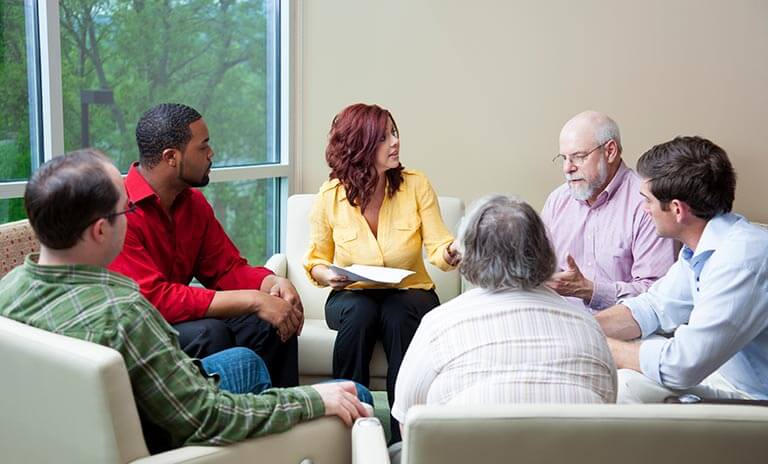Learn how to recognize the signs and symptoms of bipolar disorder and get help for yourself or a loved one. Seven Hills Hospital helps individuals struggling with bipolar disorder build a strong foundation for lasting recovery. Located near Las Vegas, Seven Hills is the leading provider of psychiatric and addiction treatment.
Understanding Bipolar
Learn About Bipolar
Bipolar disorder is a serious mental illness that affects millions of individuals throughout the world. It is a psychiatric disorder characterized by extreme mood swings which cause those suffering from the disorder to experience the lowest of emotional lows and the highest of emotional highs. When a person has bipolar disorder, he or she will struggle with significant disruptions in his or her daily life.
Bipolar disorder presents itself in a variety of forms and in various stages of severity. When receiving a diagnosis of bipolar disorder, the illness itself is classified into one of three types. These types include:
Bipolar I is the most severe type of bipolar disorder and causes the highest level of dysfunction in the lives of those suffering from it. People with bipolar I alternate between periods of mania and depression, with some experiencing manic episodes more frequently than depressive episodes or vice versa.
Bipolar II occurs when a person suffers from extreme episodes of depression, yet has experienced at least one hypomanic episode. Hypomania is similar to mania, except that the symptoms are less severe. When individuals go through a hypomanic episode, they do not typically experience the severe functional impairment typical of full-blown mania.
Cyclothymia is classified by chronic mood disturbances that alternate between mild or moderate depression and hypomania. With this type, people suffer from mood fluctuations less frequently and with less severity than individuals who have bipolar I or bipolar II.
Statistics
Bipolar Statistics
It has been estimated that approximately six million people over the age of 18 in the United States suffer from bipolar disorder, which is the equivalent of about 2.6% of the population. While the disorder most commonly presents itself initially in people around the age of 25, it can affect people of every age. For children and adolescents, bipolar disorder is believed to have a lifetime prevalence of between 0%-3%. However, only in recent years have professionals in the psychiatric field begin to recognize the presence of the disorder in children, so the true prevalence in youth is not well established.
Causes & Risks
Causes and Risk Factors of Bipolar
As is true for most mental illnesses, there is not any one specific cause believed to impact the development of bipolar disorder, but it is rather believed to be the result of a combination of different factors, including the following:
Genetic: Bipolar disorder is said to have a strong genetic component as it is known to run in families. Estimates have been provided that state that when a child has one parent who has bipolar disorder, he or she is 15%-25% more likely to develop the illness as well. However, bipolar disorder has also been known to develop in individuals who do not have a similar family history.
Physical: Chemical imbalances in the brain are believed to be the most prominent reason why people experience the onset of bipolar disorder. More specifically, an imbalance or dysfunction of neurotransmitters, which are responsible for sending messages throughout the various areas of the brain, is thought to have a direct connection to the onset of bipolar symptoms.
Environmental: The largest environmental factor that is believed to contribute to the onset of bipolar disorder is substance abuse. However, it is thought that people who begin suffering from the disorder following the use or abuse of substances had a pre-existing disposition for developing the disorder. Other environmental factors that are debated as playing a role in the onset of the illness include experiencing severe trauma or going through major life changes. Again, it is most commonly believed that a genetic or physical component already exists in the person and these environmental factors only exacerbate the symptoms or lead to an earlier onset.
Risk Factors:
- Having a first-degree relative who suffers from bipolar disorder
- Family history of other mental illnesses
- Substance abuse
- Experiencing severe trauma
- Going through major life changes or dealing with major life stressors
Signs & Symptoms
Signs and Symptoms of Bipolar
The signs and symptoms of bipolar disorder will vary from person to person depending on the specific type of the disorder that the person is suffering from (bipolar I, bipolar II, or cyclothymia), as well as what aspect of the illness causes the most distress and dysfunction (mania or depression). The following are various examples of different symptoms that a person suffering from bipolar disorder may exhibit:
Behavioral symptoms (manic episode):
- Rapid speech
- Participating in high-risk behaviors
- Impulsive behaviors
- Acting in a grandiose manner
- Moving from task to task without completing any of them
- Jumping from idea to idea or topic to topic while in conversation
- Hypersexuality
- Acting out aggressively
Behavioral symptoms (depressive episode):
- Isolates oneself from family and friends
- Misses multiple days of work or school
- Participates in self-harming behaviors
- Attempts suicide
Physical symptoms (manic episode):
- Decreased need for sleeping / sometimes going days without sleeping
- Restlessness
- Lack of appetite
- Extreme fluctuations in bodily temperature
Physical symptoms (depressive episode):
- Lack of energy
- Changes in eating and sleeping patterns
- Noticeable weight gain or weight loss
Cognitive symptoms (manic episode):
- Racing thoughts
- Easily distracted
- Flight of ideas
- Poor concentration
Cognitive symptoms (depressive episode):
- Difficulty making decisions
- Inability to concentrate
- Slowed thinking
- Experiencing visual or auditory hallucinations
Psychosocial symptoms (manic episode):
- Feeling overly happy / giddy
- Feeling as though one is invincible, that nothing can harm him or her
- Holding an unrealistic belief in one’s abilities
- Feelings of grandiosity, as though one is superior to others
- Extreme agitation or irritability
- Prolonged periods of emotional excitability
Psychosocial symptoms (depressive episode):
- Overwhelming feelings of worry
- Losing interest in things one once found enjoyable
- Low self-esteem
- Feelings of worthlessness / feeling empty inside
- Suicidal ideation
- Overwhelming feelings of guilt
Lasting Effects
Effects of Bipolar
While bipolar disorder is an illness that will continuously affect people throughout their lifetime, it can be successfully managed through a variety of therapeutic interventions, including the implementation of psychotropic medications. When left untreated, however, the symptoms can consistently get worse and have a detrimental impact on a person’s life. Some effects of untreated bipolar disorder can include:
- Job loss or academic failure
- Financial problems
- Criminal / legal involvement
- Ongoing self-injury
- Substance abuse and addiction
- Lack of healthy interpersonal relationships
- Isolation
- Suicide
Co-Occurring Disorders
Co-Occurring Disorders
There are a variety of mental illnesses that can occur alongside bipolar disorder. This may be due to the fact that the symptoms of bipolar disorder will overlap with symptoms of other disorders, or due to the fact that its symptoms may exacerbate other areas of an individual’s brain, resulting in the onset of new or different symptoms. Some examples of the most common illnesses known to occur with bipolar disorder include:
- Generalized anxiety disorder
- Obsessive-compulsive disorder
- Panic disorder
- Specific phobias
- Social anxiety disorder
- Attention-deficit/hyperactivity disorder
- Posttraumatic stress disorder
- Substance abuse disorder





















